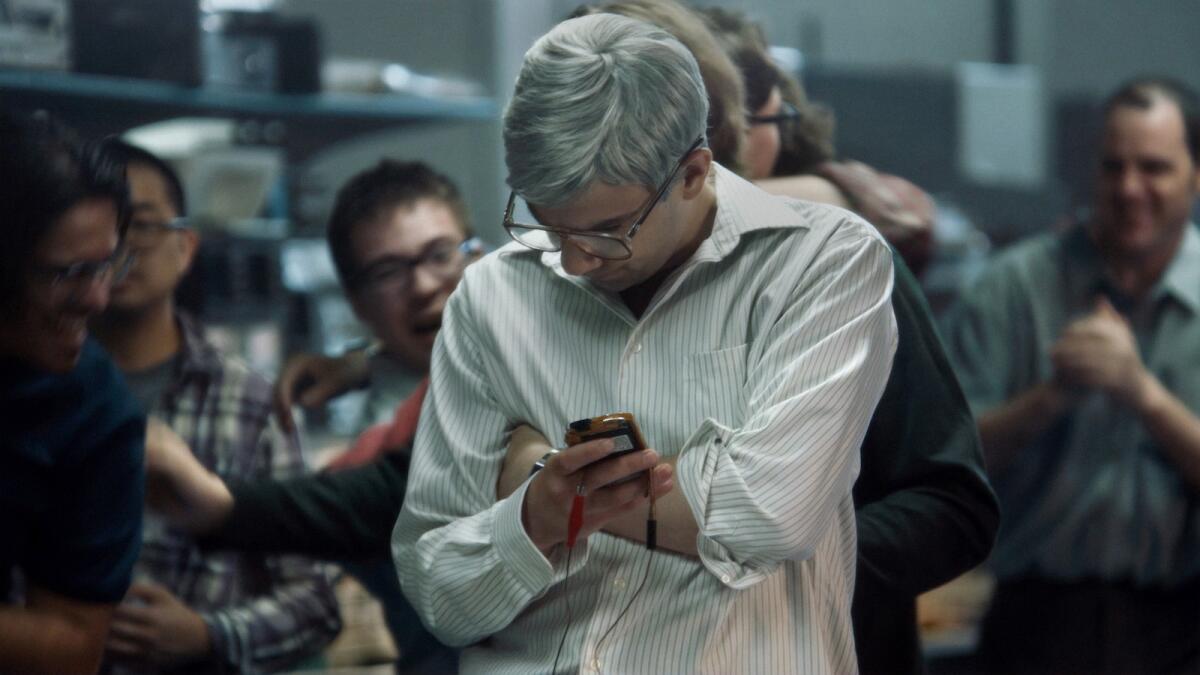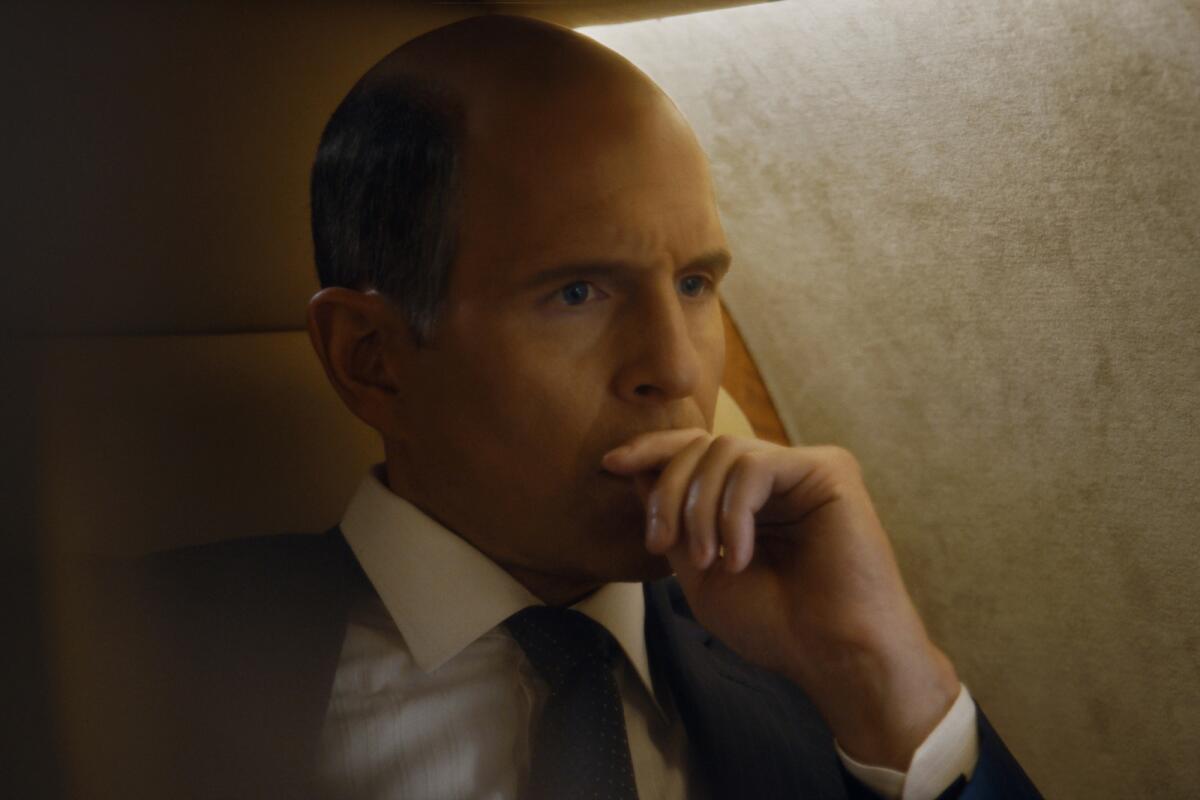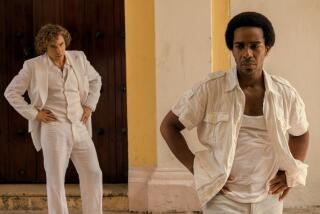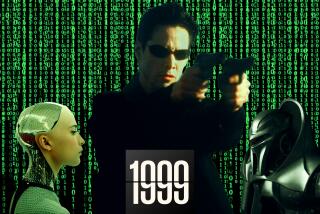Review: A frenetic take on the crash-and-burn trajectory of the iconic ‘BlackBerry’

- Share via
For a certain generation (mostly Gen X and older millennials), the BlackBerry wasn’t just a phone with email — it was a world- and life-altering shift, a status symbol that quickly became a shackle to the inbox. While those lifestyle aspects aren’t necessarily explored in the device biopic “BlackBerry,” written and directed by Matt Johnson, they float to the surface of the subconscious for those who experienced the smartphone revolution in real time.
Johnson leans into the nostalgia , seeding period-appropriate tunes like the Strokes’ “Someday” to aid the acid-flashbacks to the mid-aughts, and utilizing VHS-style camcorder footage in montage. But he also opens with a foreboding bit of archival footage of Arthur C. Clarke declaring that “men will no longer commute—they will communicate,” a promise realized to an extreme during the COVID-19 pandemic (the next corporate biopic should be “Zoom”).
The possibility of email in your fist seemed like a passport to the utopian lifestyle of the digital nomad: Just imagine, you could email from the beach. Then the reality manifests, and suddenly you have to send emails while you’re on the beach, thereby ruining the whole point of being on a beach. It meant less liberation from the office and more never not working, creating a Pavlovian response to the clicks, dings and buzzes.
Experts tell The Times why Tetris, Air Jordans, BlackBerries, Flamin’ Hot Cheetos and more are suddenly getting a star turn at the movies.
These suddenly ubiquitous devices, pressed into the hands of executives and assistants everywhere in the early 2000s, seemed to spring out of thin air, and then suddenly vanished with the advent of the touch-screen iPhone. Johnson and co-writer Matthew Miller, adapting the book “Losing the Signal: The Untold Story Behind the Extraordinary Rise and Spectacular Fall of BlackBerry,” by Jacquie McNish and Sean Silcoff, show us where the BlackBerry came from and details its demise at the hands of market forces and business missteps. Johnson, a Canadian filmmaker and actor known for the 2016 indie mockumentary “Operation Avalanche,” about NASA, situates “BlackBerry” as a proudly north-of-the-border story: a biopic of the device invented by the Waterloo, Ontario-based company Research in Motion, and a business thriller, utilizing his faux documentary style.
Cinematographer Jacob Raab’s camera is very, very busy: constantly roaming, zooming in, focusing, glancing up and down, hiding behind doors and windows, spying on the characters as if it’s someone else in the room or an amateur cameraman fiddling with a new toy.
This immersive, restless style takes a bit of getting used to, and so does Johnson, who co-stars as Douglas Fregin, the co-founder of Research in Motion and the wild, antic, playful nerd to Jay Baruchel’s brilliant but cripplingly unassertive Mike Lazaridis, who obsessively attempts to quiet the electro-buzz of products manufactured in China. They have a great plan to put email in a phone, but their business acumen is atrocious. They’re too busy having movie night with their employees to realize they’ve been taken for a million-dollar ride by U.S. Robotics.

Enter Jim Balsillie, played with a florid ferocity by Glenn Howerton, the top of his head shaved to replicate Balsillie’s male-pattern baldness. He reaches out to Mike and Doug when he finds himself out of a job and offers them an influx of cash for a stake in the company. He finds Research in Motion completely disorganized, up to its eyeballs in debt, and so he leverages his mortgage, and with his Harvard Business School training, utilizes the time-honored tradition of screaming expletives and doing light securities fraud to build BlackBerry into the market behemoth that it became.
It’s a strange sensation, watching “BlackBerry,” to find yourself rooting for morally compromised screamer Jim (Howerton is simply dazzling in the role) and the iron-fist enforcer he hires as chief operating officer, Charles Purdy (Michael Ironside). Johnson’s Doug would turn the company into a playground for his pals if he had his way, while Mike is too avoidant and passive to assert authority, leaving the dirty work to Jim. Howerton is also far and away the most charismatic performer onscreen, and you’re unable to rip your eyes away from him, though Baruchel is doing fascinating, if subtler, work as well.
What emerges from the electronic noise and fussy aesthetic of “BlackBerry” is a compelling portrait of a company that flew too close to the sun. Jim’s fast-and-loose tactics in running the business — poaching talent from Google, creating demand for the devices as status symbols, and selling them before the network capability was established — are matched by Mike’s innovative mind, but it could only last for so long, especially with Apple nipping at their heels. However, it’s the shortcuts and shady deals that do them in, not the shiny new iPhone.
Perhaps Mike, a man driven by the sonic and tactile experience of electronics, was too attached to the satisfying clicking of the tiny keyboard. With 2000s nostalgia in the zeitgeist, maybe Icarus will rise again, though Johnson’s portrait indicates how unlikely that would be.
'BlackBerry'
Rated: R, for language throughout
Running time: 2 hours, 4 minutes
Playing: Starts May 12 in general release
More to Read
Only good movies
Get the Indie Focus newsletter, Mark Olsen's weekly guide to the world of cinema.
You may occasionally receive promotional content from the Los Angeles Times.











